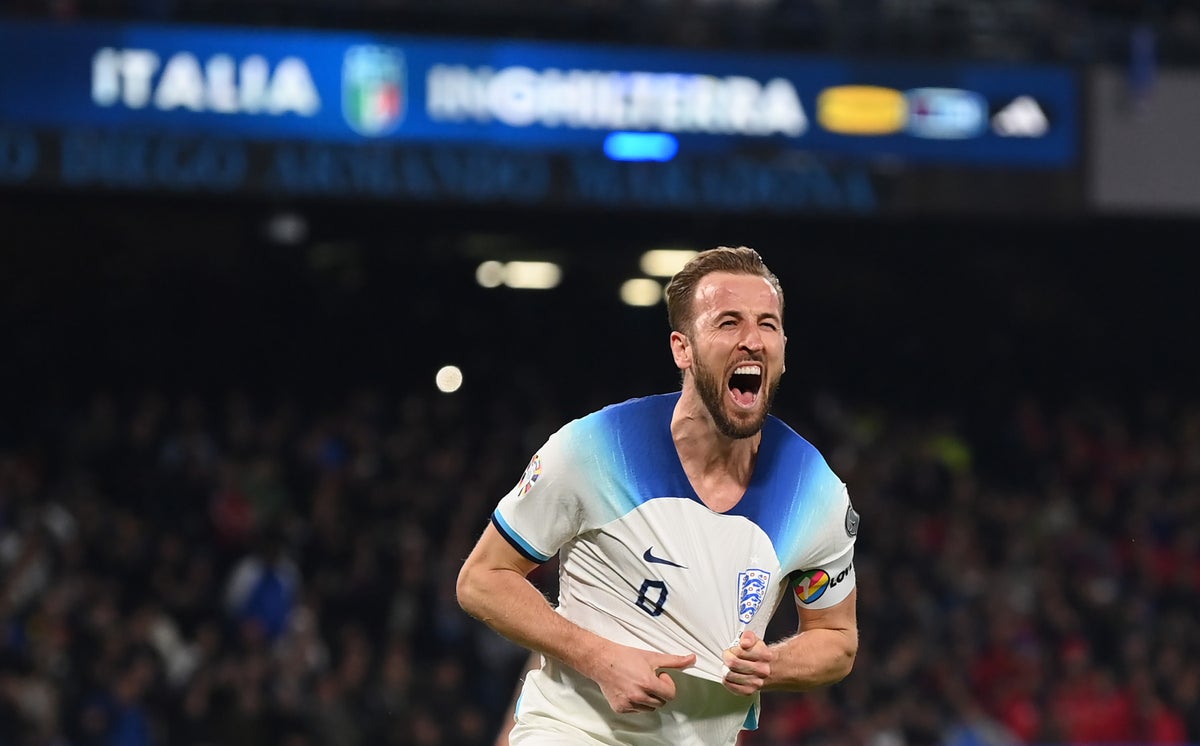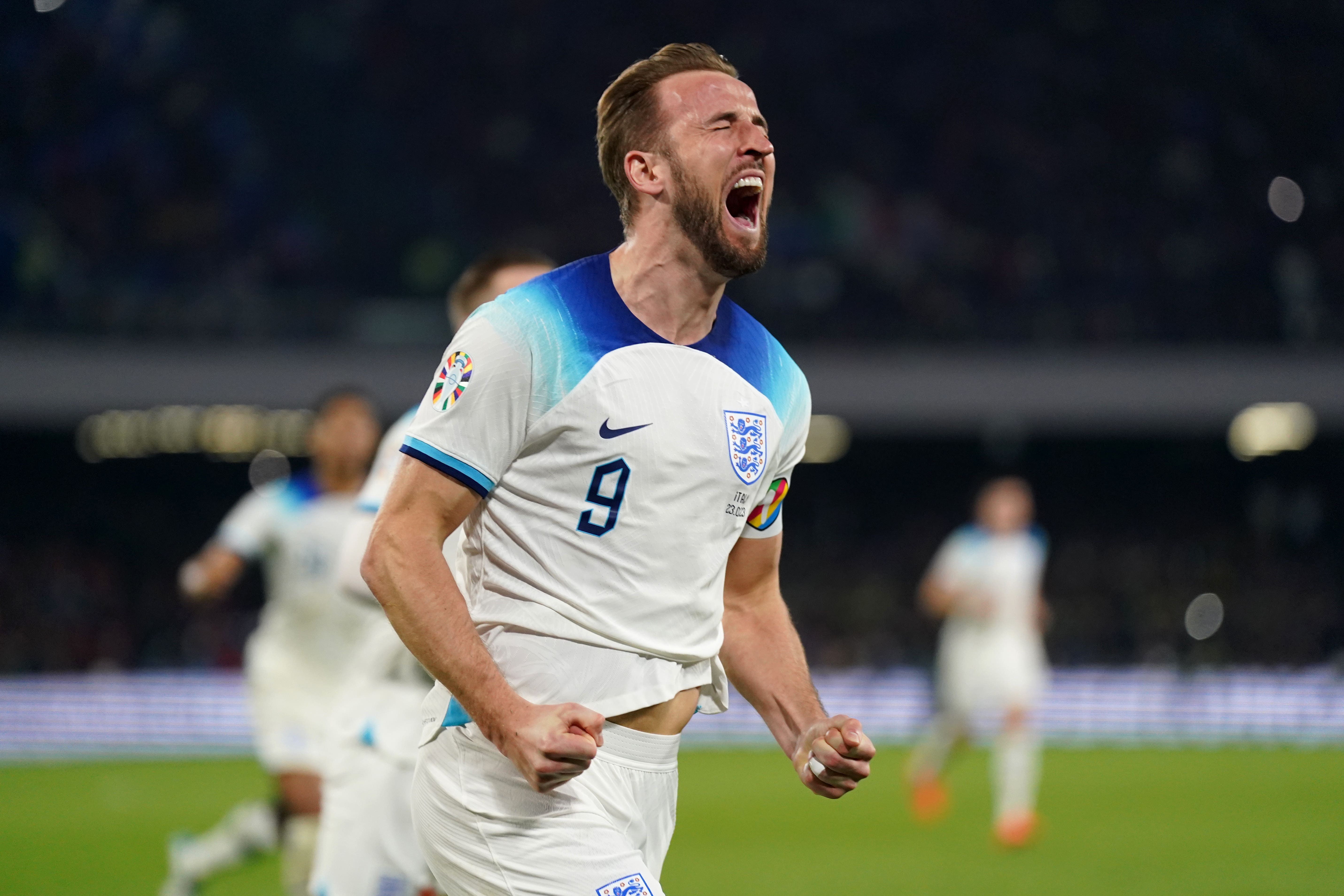
Deep breath, a couple of steps on the spot, a short run-up and a sidefoot. And there it was: history for Harry Kane. Some 1271 men have played for the senior England team and the other 1270 have scored fewer goals than him. At a ground named after one of the greatest footballers, the Stadio Diego Armando Maradona, Kane demonstrated some of the reasons why he has become a great goalscorer.
A penalty was not just a penalty. It was an opportunity to relive the most traumatic moment of his career. A previous Tottenham favourite, Chris Waddle, never wanted to take spot kicks again after ballooning one in a World Cup, with costly consequences. Kane could have got the England record 103 days earlier except that, after drawing level with Wayne Rooney, he contrived to sky a second penalty. He has admitted it is likely to live with him for as long as he is around.
But there is a steel behind a seemingly guileless facade. Kane can seem uncomplicated, and maybe he is: penalties offer opportunities for more goals, so Kane takes them. Normally very well, too. And so, when Giovanni di Lorenzo was deemed to have handled, up he stepped. Gianluigi Donnarumma guessed wrong. Kane struck the side-netting. Fifty-four: it doesn’t seem an iconic number, because Wayne Rooney’s record of 53 only stood for a few years, because, for the best part of half a century, the target was Bobby Charlton’s 49. It probably won’t be an iconic number, either, because Kane is likely to set a rather higher target for his successors.
Sometimes a momentous achievement has the feel of normality, though. It has long seemed inevitable that Kane would get the record: it was just a question of where and when. He has brought a rigour and relentlessness to goalscoring, mastering the numbers game like a particularly dogged accountant.
Maradona was long Napoli’s record scorer but in a more mercurial, magical way. Kane can be damned as a dullard but he has made the hardest element of football seem formulaic. Penalties have helped, of course: one-third of Kane’s England goals have come from 12 yards and he has doubled Frank Lampard’s tally from the spot, the previous most.
But penalties come with peril, as Kane can testify after his misadventures at the Al Bayt. The simplistic temptation to paint a successful spot kick as redemptive should be ignored: firstly, because some penalties matter more than others, and a World Cup quarter-final has greater significance than a Euro 2024 qualifier, even if secured England’s first away win over Italy since 1961. And secondly because, as Gareth Southgate repeatedly says, Kane has nothing to apologise for. The second most successful era in England’s 151 years of international football would scarcely have been possible without him. Not just because of his goals, either.
He is much more than just a scorer; while he passed the test of character from 12 yards, arguably his finest contribution was the wonderful low cross to give Jack Grealish a tap-in he instead skewed wide. His three assists in the World Cup were the joint most. He is the striker who tries to double up as the playmaker, the player who was described as a hybrid between Alan Shearer and Teddy Sheringham and who ended up with more goals for his country than the Euro ’96 strike force got between them. Kane has, of course, preyed on the weak – though Shearer, for one, would see nothing wrong in that. He has benefited from the break-up of eastern European countries into smaller states. But he has 48 goals in competitive internationals.

And, whoever the opponents, he has ploughed on regardless. His first goal for England came after 80 seconds on the pitch, his record breaker in 81 caps. It has been swift progress: four days short of eight years since his debut, four months before his 30th birthday. Kane was no teenage prodigy but his twenties have been remarkably productive.
He took Tottenham’s record from Jimmy Greaves in February, England’s from Rooney in March. The regular criticism, drawn straight from the ranks of whataboutery, is that he may have records but he doesn’t have any medals. That is true: it is nevertheless a crude and one-dimensional measure to judge footballers. Worse players than Kane have won the Premier League, the Champions League and the World Cup. Some better footballers have scored fewer goals.
A more rounded assessment is invariably required. But Kane has three feats that, whatever others do in future, will stand the test of time: being England and Spurs’ leading scorers, potentially for a long time, and a World Cup Golden Boot winner amounts to a formidable body of work. His teams have never got the fulfilment of lifting the major prizes. But in the individual scoring charts, Harry Kane stands apart from everyone else.







